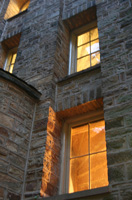2.1.- Modals for deduction.
Citas Para Pensar
"One must be poor to know the luxury of giving." George Eliot.

We can use these modal verbs (also called modals of probability, speculation or certainty) when we want to make a guess about something. We choose the verb depending on how sure we are.
We use may, might or could to say that something is possible or probable in the present or in the future.
-
May (more probable)
-
Where is Kurt? He may be at home or he might be at the sports pavilion.
-
-
Might (the possibility is quite remote)
-
I might study Medicine next year, but I don't think I will.
-
-
Could (less probable, too)
-
Where is Jane? I don't know, she could be at school. (might is also possible).
-
-
Must is used in an affirmative sentence to say that we are sure about something.
- My students get very high marks. They must study very hard.(I am sure that they are studying a lot).
-
The lights are on. Someone must be in. (I am sure there is someone in the house).
-
Can't is used in negative sentences to say that something is impossible.
- They can't be brothers. They are completely different. (It is impossible that they are brothers).
- They can't be in, as the lights are off.(It is impossible that there is someone in the house).
When talking about the present there is a line that goes from very probable to almost impossible.
For example: I am waiting for Julie with another friend, David.
I ask: "Where is Julie?"
David guesses:
- She must be on the bus. (about 95% possible)
- She may be in the wrong room. (about 50% possible)
- She might come soon. (about 30% possible)
- She could be lost. (about 30% possible)
- She can’t be at home. (about 5% possible)
Notice that the opposite of must is can’t in this case.